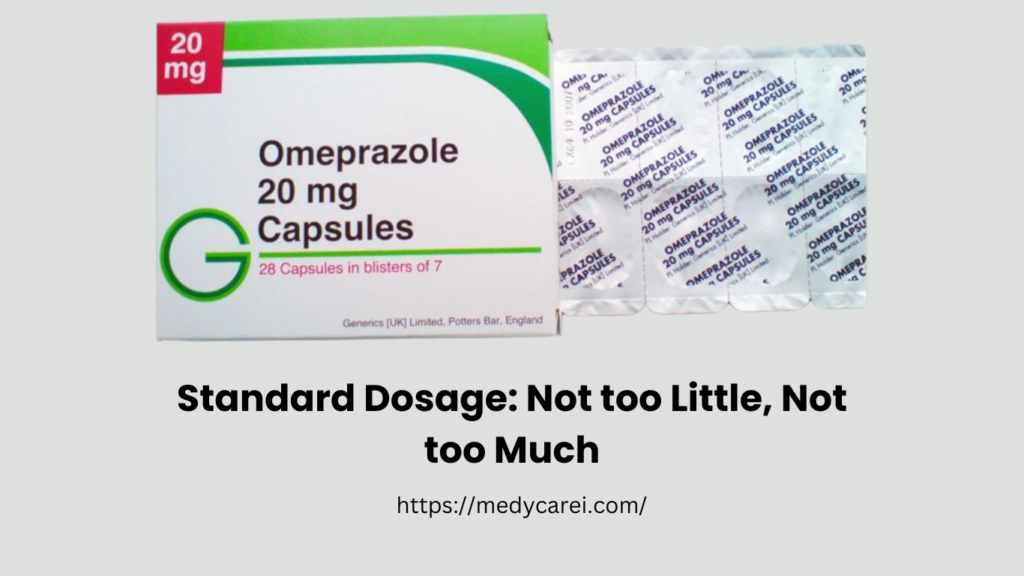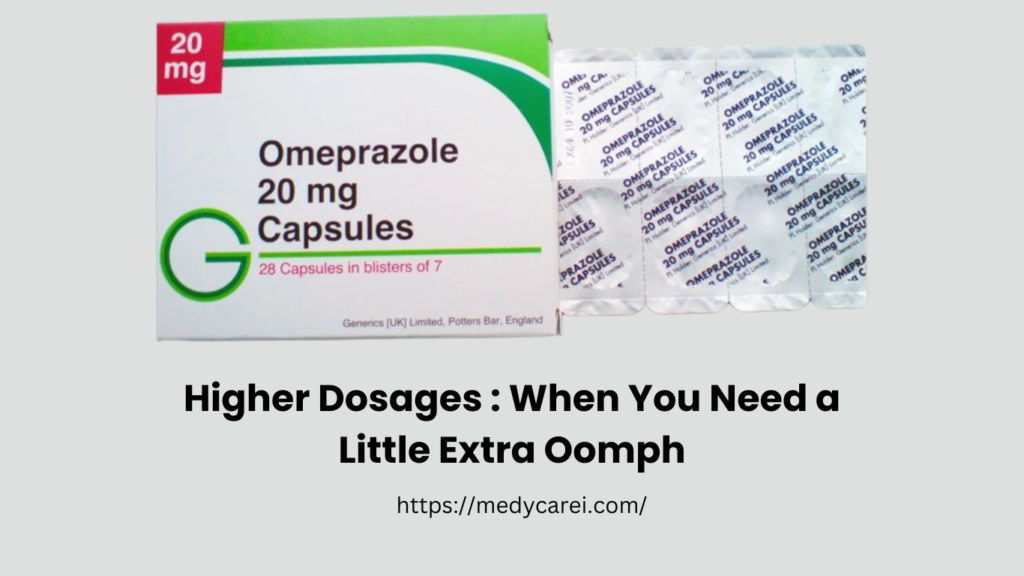You feel it coming up again—a familiar burn in your chest? No, that’s not the fire of passion—though that would be a lot more fun! What you’re dealing with is GERD, short for Gastroesophageal Reflux Disease. Basically, your stomach is staging a revolt, sending acid back up into your oesophagus; ouch! But fear not, because Omeprazole will ride to your rescue. It’s kind of like a fire extinguisher for your insides, cooling things down so that you can actually get on with your life—without the fiery theatrics. But how much should you take? Let’s break it down so you can find that magic curve: Omeprazole GERD dosage.
What is Omeprazole?
We’re going to talk numbers but first, let’s discuss what Omeprazole is. Think of it as the superhero of your stomach—without the cape and the ability to fly. Omeprazole is a proton pump inhibitor, or PPI. Now, that does sound like something out of a science fiction movie, but really, it’s pretty simple. The little pill works by reducing the amount of acid your stomach makes. Instead of your stomach going full-blast with its acid production, Omeprazole tells it to chill out.
But, as with every superhero, there is a catch. You need the dosage to be just right, so that Omeprazole will do its job, but not so much of it. So much and you could meet other problems. Let’s see how much you’ll need.
Standard Dosage: Not too Little, Not too Much

When it comes to finding the right dose of Omeprazole for GERD, it’s a lot like finding a pillow with good neck support that isn’t too soft or too hard. The recommended dose for an adult with diagnosed GERD is normally 20 mg to be administrated once a day before a meal. In numerous cases, this is the sweet quantity. It’s just enough to keep that pesky acid in check but not overboard.
Pro tip: Take Omeprazole in the morning before breakfast. That is usually when the acid production in your stomach is at its peak, and with Omeprazole swooping in to save the day, it works its magic before things really blow up. Think of it like a security guard that keeps the troublemakers—acid—at bay.
Higher Dosages : When You Need a Little Extra Oomph

Sometimes 20 mg just doesn’t cut it. Maybe that GERD of yours is especially stubborn, or maybe you’ve been going a little heavy on the spicy food as of late. In these cases, your doctor may increase your dosage to 40 mg a day. This is like calling in reinforcements—double the dose, double the acid-fighting power.
But here’s the thing: don’t just up your dose on your own. It might seem tempting, and especially if you are really struggling it can feel like something you must do, but that doesn’t mean more is better. Higher doses can create new problems of their own, like headaches or even low magnesium levels for long-term use. Always chat with your doc before making any changes.
Maintenance Dosage: Keeping Things Under Control
This does not always mean that you have to keep using the higher dosage, as long-term use of high doses of Omeprazole could have some unwanted effects, such as leading to some nutrient deficiencies or even problems with the bones. For this reason, your physician may advise a maintenance dose, usually between 10 mg and 20 mg daily, in order to keep things steady without going overboard.
Think of this as going from firefighting mode to fire prevention. You’re not dealing with a full-on blaze anymore, but you still want to keep a few safeguards in place just in case.
Is Omeprazole With Children?
Have a little one with GERD? Well, omeprazole isn’t a tall-people thing; little people benefit, too. When it comes to dosing, though, things can get a little tricky with kids. Doctors usually dose based on weight, so it’s not quite a one-size-fits-all kind of deal. Generally, though, it runs from 10 mg to 20 mg. DEFINITELY check with that paediatrician, because not only are doctors more dialled in about your child’s health, but they’re also way better at math than we are.
Funny thought: Have you ever tried to get a kid to swallow a pill? It’s like getting a cat to take a bath—do-able, but not without some serious persuasion. If your child has difficulty with pills, you can ask your doctor about other forms of Omeprazole, such as the liquid suspension.
How Long Should You Take Omeprazole
Now, you might be thinking, “Then how long do I have to deal with this stuff?” That’s a good question! It really does vary. For some people, they only need to take a course for 4-8 weeks to be rid of that heartburn for good. Others, especially who have chronic GERD, might need longer-term treatment. Remember though, only take Omeprazole long term if prescribed by your doctor.
You know why? While Omeprazole is brilliant at putting out the fire, it doesn’t address the cause of GERD. Besides, staying on it too long has its own problems, such as being associated with an increased risk of bone fractures or developing a vitamin B12 deficiency. So, it’s all about finding that balance—sort of in the way you’d balance a spoon on your nose, except, well, a bit more serious.
Possible Side Effects: What to Look Out For
Every medicine has its share of side effects. Omeprazole is no exception. Most of the time, these are pretty mild and may include things like:
- Headaches (nothing a little nap can’t fix)
- Stomach pain (ironic, right?)
- Nausea (we get it, your stomach is complicated)
Other, more serious side effects to watch out for, particularly if you’re taking Omeprazole over a long period, are:
Low blood magnesium levels, which possibly could make you experience muscle spasms or irregular heartbeats
Vitamin B12 deficiency that may bring about fatigue or even nerve issues
An increased bone fracture risk in case of very long-term intake
Note: These side effects sound pretty scary, but they’re actually pretty rare. Just remember to use Omeprazole as directed and check in with your doctor regularly. If anything seems a little off—for example, muscle cramps or noticing that you’ve been unusually tired lately—check with your doc for follow-up.
Omeprazole is such a useful tool against the symptoms of GERD, but it certainly isn’t a magic wand. Here are some more tips on getting the very best out of your Omeprazole GERD dosage:
- Eat smaller meals: Less food means less acid—a win-win.
- Avoid trigger foods: Like those spicy tacos. Know what specifically is your trigger, so try to avoid it.
- Remain upright after eating: Gravity is the friend here. Lying down right after a meal is practically a disaster waiting to happen.
- Don’t smoke: As if you needed another reason to quit. Smoking makes GERD symptoms worse.
Adding these to your routine can help you effectively manage GERD—and might even mean you need less Omeprazole in the long run.
When to Call in the Experts
If you’ve been on Omeprazole and your symptoms don’t seem to be improving or you get some serious side effects from it, then it’s time to check in with your doctor. They may have to readjust your dosage or try a new approach to treatment. GERD is a serious business, and what usually works for one might not work for another. You mustn’t be shy; your doctor is there to help you!
Related Topic : Everything you Need to Know About Ranitidine 150mg Uses
Conclusion: GERD really can be a pain in the chest, but with the right dose of omeprazole and a few lifestyle changes, you can put out that fire and get on with really living again. Even if it’s for those spicy tacos.
Finding the right dose of omeprazole for GERD can be likened to finding the perfect pair of jeans: there might be a little trial and error, but once you find the right fit, you are on point. Start with the standard dose, keep an eye on how you are feeling, and don’t hesitate to reach out to your doctor if you need a little extra help. With Omeprazole and a few clever lifestyle modifications, you’ll be well on your way to lasting comfort and a life free of GERD. Cheers!
Disclaimer
The information provided on this blog regarding medicine prices and side effects is solely based on data collected from public domains. I am not a doctor or medical professional. While I strive to provide accurate and up-to-date information, I cannot guarantee the absolute accuracy or completeness of the data. It is always recommended to consult with a qualified healthcare professional or doctor for personalized medical advice and information. The content on this blog should not assume any responsibility for any consequences arising from the use of the information on this blog.
Thank you.
